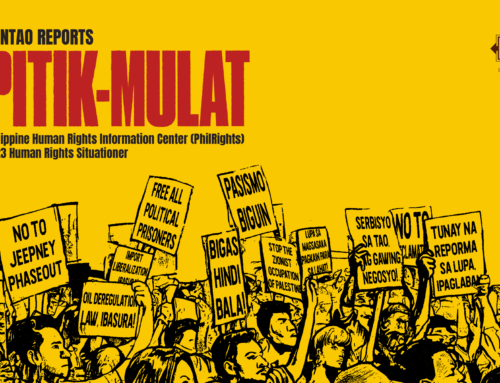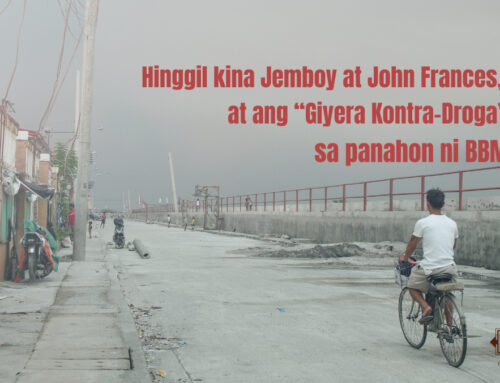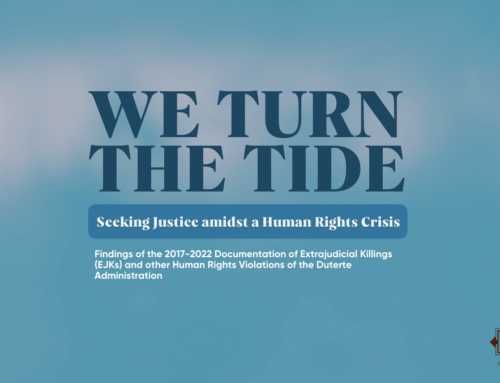by PhilRights Staff
Welcome to HR Insights, a weekly roundup of human rights news in the Philippines. This week…
“My only sin is the extrajudicial killings,” Duterte says
President Rodrigo Duterte seemed to have admitted his accountability for the ongoing extrajudicial killings (EJKs) during a speech in Malacañang, September 27, saying that this is the ‘only’ sin he is guilty of.
This was conflicting with his previous pronouncements on EJKs, only going so far as acknowledging its existence but insisting that these were not State-sponsored killings. He has also admitted that some so-called ‘’ninja cops’’ are behind these killings. ‘’It’s an organized crime, really’’, he added.
As of 2018, there are already more than 23,000 victims of EJKs nationwide and this continues to receive global criticism and condemnation. In fact, the International Criminal Court has already announced the conduct of a preliminary examination on the killings, prompting President Duterte to order the country’s withdrawal from the global body.
DOLE foresees more layoffs under Trabaho bill
Department of Labor and Employment (DOLE) Director Dominique Tutay warned that more people will be jobless if the government will push for the approval of the Tax Reform for Attracting Better and High Quality Opportunities, or Trabaho bill, in its current form.
Based on the recent findings of DOLE’s study about the bill, Tutay specified that it will mostly affect those who work in the technology-driven industry and services sector. DOLE’s fears were also reflected in a Confederation of Wearables Exporters of the Philippines’ (ConWEP) study that layoffs in the apparel industry could amount to 40% of the workforce if the Trabaho bill becomes a law.
However, Department of Finance (DOF) Undersecretary Karl Kendrick Chua allayed DOLE’s fears regarding the bill. Chua said that while there may be job losses, employment in other sectors would increase due to lower corporate income taxes. He added that with lowered taxes, small entrepreneurs could expand their businesses; hence generating more jobs in the future.
The Trabaho bill is close to becoming a law as the House of Representatives has already approved it with 187/204 votes during its final reading last September 10. The Trabaho bill is planned as part of the TRAIN laws, with Trabaho aiming to lower corporate income taxes (CIT) down to 20% and modernize incentives given to companies.
Filipina ‘terrorist’ wins UN’s Champion of the Earth award
Joan Carling, an indigenous rights and environment activist from Cordillera whom the government officially declared a ‘terrorist’ received the Champions of the Earth award for lifetime achievement, the United Nations’ (UN) highest environmental honor.
Carling has been at the forefront of defending Indigenous People’s rights and the environment from grassroots to international levels for more than 20 years. She was a former chair of the militant Cordillera Peoples Alliance and a former secretary general of the Asia Indigenous Peoples Pact based in Thailand.
But defending IP rights and the environment brought Carling threats to her life and security. In an article published by Inquirer, Carling was among the “600 individuals who were considered terrorists by the Duterte administration for allegedly being members of the Communist Party of the Philippines” in the prescription petition filed by the Department of Justice (DOJ). Carling was also accused of being a leader of the People’s Army (NPA) by the PNP Intelligence group.
The terrorist petition has been criticized by several groups as being “baseless” and it has brought danger to the lives of those who were in the list, including Carling. The UN has already expressed their support for Carling and other Filipino activists and called on the Duterte administration to drop the accusations against them.
MUST READ: Rising inflation, most urgent concern of Filipinos
Based on a Pulse Asia Survey, “63% of Filipinos want the Duterte administration to immediately address inflation or the rate of increase in prices.” Other concerns include increasing worker’s pay (50%), reducing poverty (32%), creating more jobs (30%), and fighting graft and corruption (26%).








